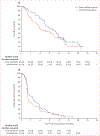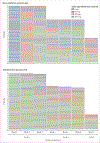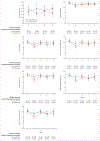Regorafenib dose-optimisation in patients with refractory metastatic colorectal cancer (ReDOS): a randomised, multicentre, open-label, phase 2 study
- PMID: 31262657
- PMCID: PMC9187307
- DOI: 10.1016/S1470-2045(19)30272-4
Regorafenib dose-optimisation in patients with refractory metastatic colorectal cancer (ReDOS): a randomised, multicentre, open-label, phase 2 study
Abstract
Background: Regorafenib confers an overall survival benefit in patients with refractory metastatic colorectal cancer; however, the adverse event profile of regorafenib has limited its use. Despite no supportive evidence, various dosing schedules are used clinically to alleviate toxicities. This study evaluated the safety and activity of two regorafenib dosing schedules.
Methods: In this randomised, multicentre, open-label, phase 2 study done in 39 outpatient cancer centres in the USA, adults aged 18 years or older with histologically or cytologically confirmed advanced or metastatic adenocarcinoma of the colon or rectum that was refractory to previous standard therapy, including EGFR inhibitors if KRAS wild-type, were enrolled. Eligible patients had an Eastern Cooperative Oncology Group performance status of 0-1 and had no previous treatment with regorafenib. Patients were randomly assigned (1:1:1:1) into four groups with two distinct regorafenib dosing strategies and two clobetasol usage plans, stratified by hospital. Regorafenib dosing strategies were a dose-escalation strategy (starting dose 80 mg/day orally with weekly escalation, per 40 mg increment, to 160 mg/day regorafenib) if no significant drug-related adverse events occurred and a standard-dose strategy (160 mg/day orally) for 21 days of a 28-day cycle. Clobetasol usage plans (0·05% clobetasol cream twice daily applied to palms and soles) were either pre-emptive or reactive. After randomisation to the four preplanned groups, using the Pocock and Simon dynamic allocation procedures stratified by the treating hospitals, we formally tested the interaction between the two interventions, dosing strategy and clobetasol usage. Given the absence of a significant interaction (p=0·74), we decided to pool the data for the pre-emptive and reactive treatment with clobetasol and compared the two dosing strategies (dose escalation vs standard dose). The primary endpoint was the proportion of evaluable patients (defined as those who were eligible, consented, and received any protocol treatment) initiating cycle 3 and was analysed per protocol. Superiority for dose escalation was declared if the one-sided p value with Fisher's exact test was less than 0·2. This trial is registered with ClinicalTrials.gov, number NCT02368886. This study is fully accrued but remains active.
Findings: Between June 2, 2015, and June 22, 2017, 123 patients were randomly assigned to treatment, of whom 116 (94%) were evaluable. The per-protocol population consisted of 54 patients in the dose-escalation group and 62 in the standard-dose group. At data cutoff on July 24, 2018, median follow-up was 1·18 years (IQR 0·98-1·57). The primary endpoint was met: 23 (43%, 95% CI 29-56) of 54 patients in the dose-escalation group initiated cycle 3 versus 16 (26%, 15-37) of 62 patients in the standard-dose group (one-sided p=0·043). The most common grade 3-4 adverse events were fatigue (seven [13%] patients in the dose-escalation group vs 11 [18%] in the standard-dose group), hand-foot skin reaction (eight [15%] patients vs ten [16%] patients), abdominal pain (nine [17%] patients vs four [6%] patients), and hypertension (four [7%] patients vs nine [15%] patients). 14 patients had at least one drug-related serious adverse event: six patients in the dose-escalation group and eight patients in the standard-dose group. There was one probable treatment-related death in the standard-dose group (myocardial infarction).
Interpretation: The dose-escalation dosing strategy represents an alternative approach for optimising regorafenib dosing with comparable activity and lower incidence of adverse events and could be implemented in clinical practice on the basis of these data.
Funding: Bayer HealthCare Pharmaceuticals.
Copyright © 2019 Elsevier Ltd. All rights reserved.
Figures




Comment in
-
Study evidence confirms current clinical practice in refractory metastatic colorectal cancer: the ReDOS trial.Lancet Oncol. 2019 Aug;20(8):1036-1037. doi: 10.1016/S1470-2045(19)30390-0. Epub 2019 Jun 28. Lancet Oncol. 2019. PMID: 31262656 No abstract available.
References
-
- Bray F, Ferlay J, Soerjomataram I, et al. Global cancer statistics 2018: GLOBOCAN estimates of incidence and mortality worldwide for 36 cancers in 185 countries. Ca Cancer J Clin 2018; 68: 394–424. - PubMed
-
- Wilhelm SM, Dumas J, Adnane L, et al. Regorafenib (BAY 73–4506): a new oral multikinase inhibitor of angiogenic, stromal and oncogenic receptor tyrosine kinases with potent preclinical antitumor activity. Int J Cancer 2011; 129: 245–55. - PubMed
-
- Grothey A, Van Cutsem E, Sobrero A, et al. Regorafenib monotherapy for previously treated metastatic colorectal cancer (CORRECT): an international, multicentre, randomised, placebo-controlled, phase 3 trial. Lancet 2013; 381: 303–12. - PubMed
-
- Li J, Qin S, Xu R, et al. Regorafenib plus best supportive care versus placebo plus best supportive care in Asian patients with previously treated metastatic colorectal cancer (CONCUR): a randomised, double-blind, placebo-controlled, phase 3 trial. Lancet Oncol 2015; 16: 619–29. - PubMed
-
- Grothey A, Sobrero AF, Siena S, et al. Time profile of adverse events (AEs) from regorafenib (REG) treatment for metastatic colorectal cancer (mCRC) in the phase III CORRECT study. Proc Am Sol Clin Oncol 2013; 31 (suppl 15): 3637 (abstr).
Publication types
MeSH terms
Substances
Associated data
Grants and funding
LinkOut - more resources
Full Text Sources
Medical
Research Materials
Miscellaneous

